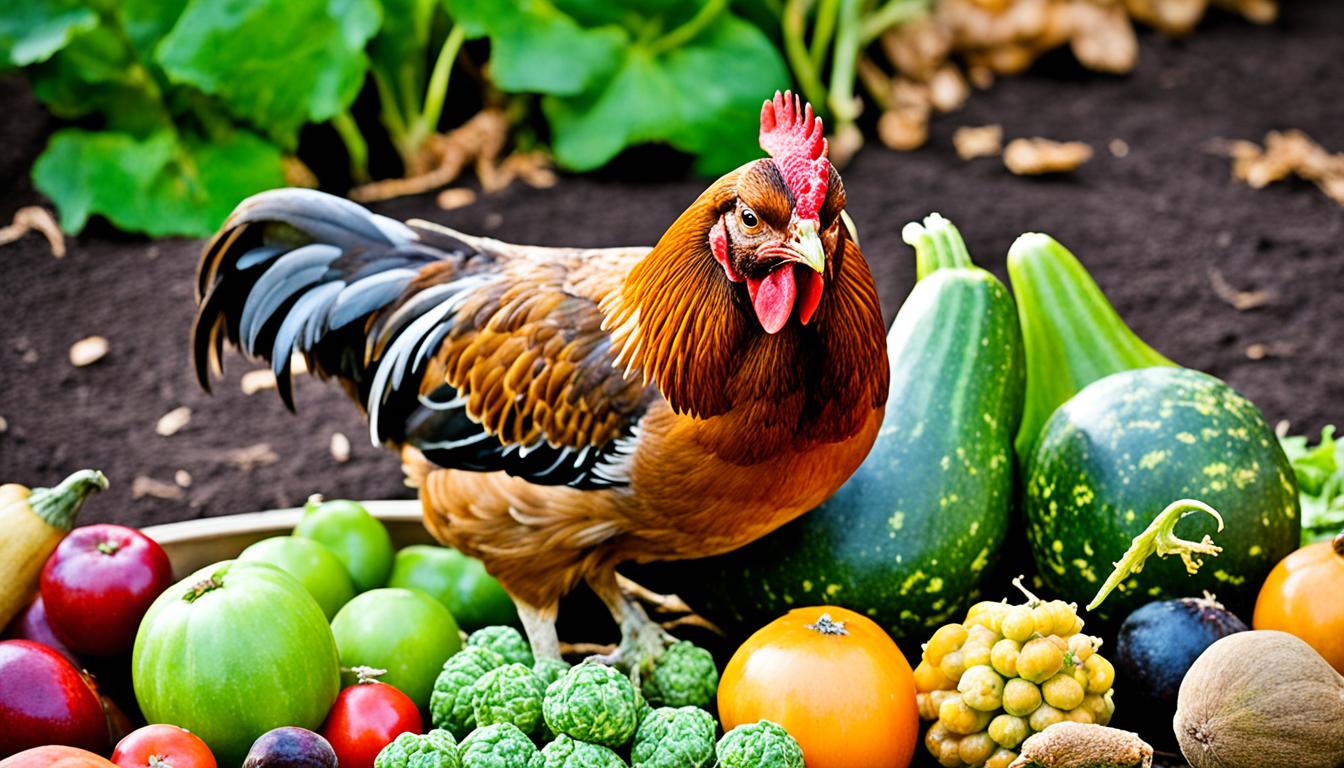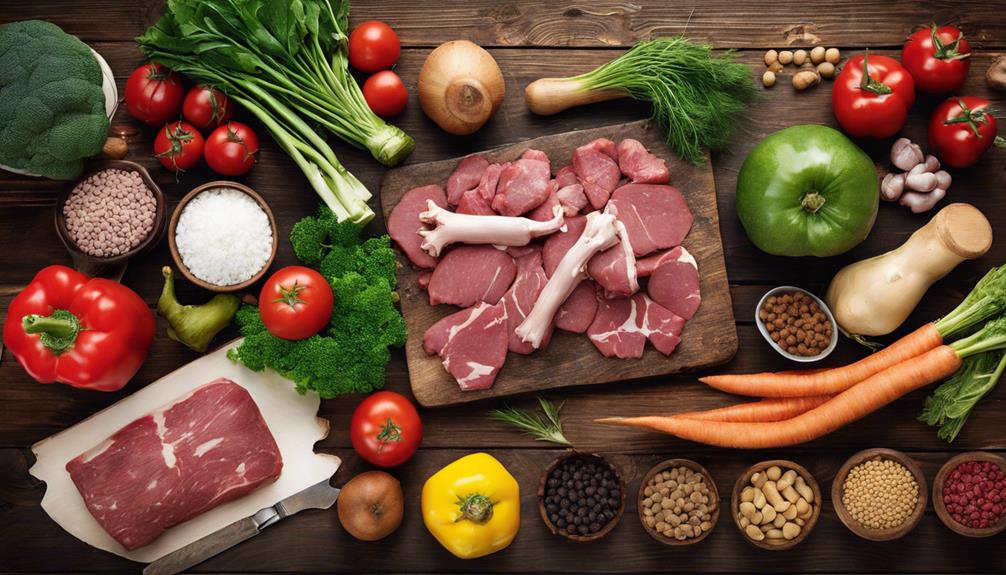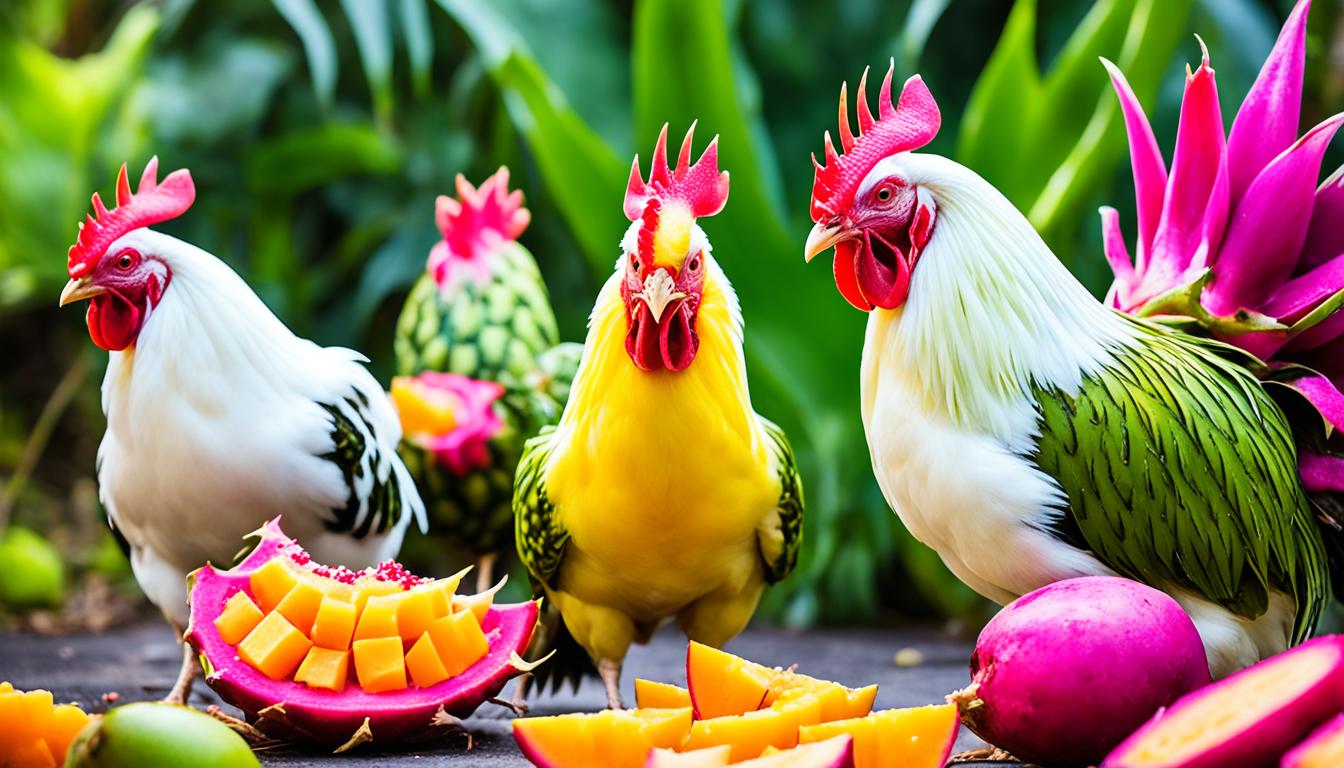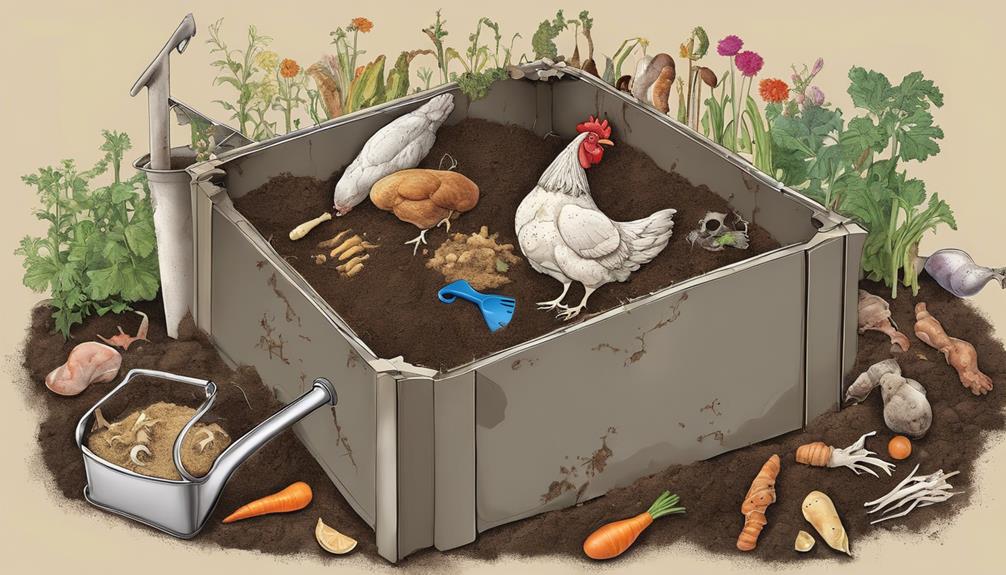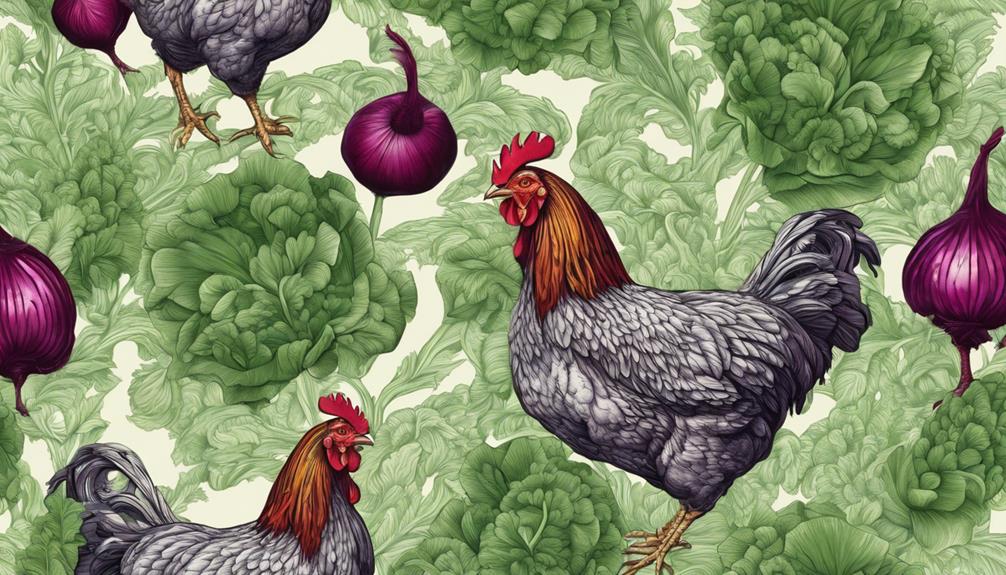Did you know that gourds, including pumpkins and other squash varieties, can be a healthy and safe snack for chickens? These feathery friends can enjoy the flesh, seeds, and even the skin of gourds, providing them with a nutritious treat. However, it’s important to be cautious and avoid feeding chickens moldy, decorated, or painted gourds, as these can be harmful to their health. In this guide, we’ll explore what chickens can eat, the dos and don’ts of feeding treats, and provide you with a list of safe and healthy options.
Key Takeaways:
- Gourds like pumpkins and squash varieties can be a healthy and safe snack for chickens.
- Chickens can consume the flesh, seeds, and skin of gourds.
- Avoid feeding chickens moldy, decorated, or painted gourds.
- Feeding treats should be done in moderation, with a focus on natural and wholesome options.
- A high-quality complete feed should always be the primary source of nutrients for chickens.
What Should Chickens Eat?
Chickens have a similar digestive system to humans and can eat a wide variety of foods. It’s important to ensure they receive a balanced and nutritious diet to maintain their health and wellbeing. While a complete poultry feed should be the primary source of nutrients for chickens, they can also enjoy other foods to supplement their diet.
The Importance of a Complete Feed
A complete poultry feed is specially formulated to provide chickens with all the necessary nutrients in the correct proportions. It contains a balanced combination of grains, proteins, vitamins, and minerals, ensuring optimal growth, egg production, and overall health. Feeding chickens a complete feed is essential for meeting their nutritional requirements and preventing deficiencies.
Fruits and Vegetables for Added Nutrition
In addition to a complete feed, chickens can benefit from the consumption of fresh fruits and vegetables. These provide additional vitamins, minerals, and fiber to their diet. Fruits like apples, watermelon, and berries are rich in antioxidants and can be offered as treats or added to their feed. Vegetables such as leafy greens, carrots, and cucumbers are also excellent choices and can be given raw or cooked.
Cooked Foods and Scraps
Cooked foods can be a tasty and nutritious treat for chickens. Leftover rice, pasta, or mashed potatoes are safe options that can be mixed with their feed or given separately. However, it’s important to avoid giving them spicy or heavily seasoned foods as it can upset their stomachs. Additionally, chickens can consume certain kitchen scraps like vegetable peels or trimmings, as long as they are free from any harmful substances or pesticides.
Treats in Moderation
While it’s tempting to spoil chickens with treats, it’s essential to remember that they should only make up a small portion of their overall diet. Too many treats can disrupt the balance of nutrients and lead to nutritional deficiencies. Treats should never exceed 10% of their total food intake, with the remaining 90% being a complete feed.
Feeding treats to chickens can be a wonderful way to bond with them, but it’s important to do so in moderation.
Meats as Occasional Treats
Chickens can also enjoy small amounts of cooked meat as treats. However, it’s crucial to avoid giving them large portions of uncooked meat, as it may contain harmful bacteria and increase the risk of contamination. Cooked chicken, turkey, or even small pieces of cooked beef or pork can be offered as a special treat, ensuring it is given sparingly and in small, bite-sized pieces.
Overall, a balanced diet consisting of a complete poultry feed, supplemented with fresh fruits, vegetables, and occasional treats, will provide chickens with the necessary nutrition for optimal health and productivity.
The Good List: What Chickens Can Eat
Chickens are not picky eaters and can enjoy a wide range of foods that are safe and beneficial for their health. Including fresh fruits, vegetables, and leafy greens in their diet can provide them with vital nutrients and keep them happy and healthy. They can relish a variety of fruits such as juicy apples, succulent pears, and nutrient-rich pumpkins. Vegetables like crunchy lettuce, sweet carrots, and nutritious broccoli are also excellent choices for chickens.
“Chickens can eat almost anything that humans can eat.”
Cooked foods are often more palatable and safer for chickens to eat. They can indulge in cooked meats occasionally, but it is important to ensure that the meats are not moldy or rancid. A high-quality feed should always be the primary source of nutrients for chickens, supplemented by these tasty treats.
To summarize, here is a comprehensive list of foods that chickens can enjoy:
- Fruits, such as apples, pears, and pumpkins
- Vegetables, including lettuce, carrots, and broccoli
- Cooked meats (in moderation)
Feeding chickens these nutritious foods will contribute to their overall well-being and ensure they receive a balanced diet.
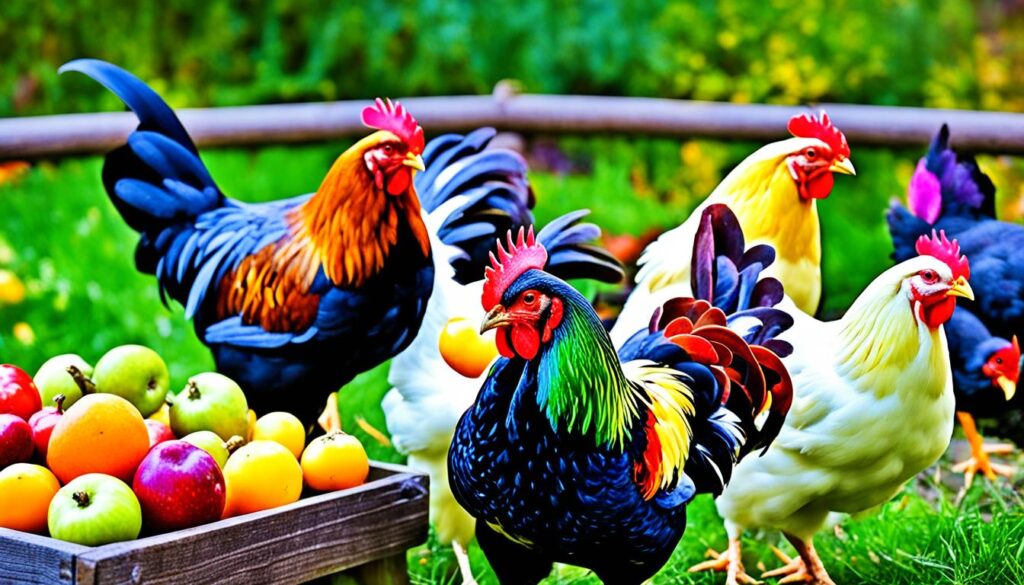
The Bad List: What Chickens Should Avoid Eating
While chickens are omnivorous and can eat a wide range of foods, there are some items that they should avoid consuming. It’s important to be aware of these foods to ensure the health and well-being of your chickens. The bad list includes raw beans, salty foods, and moldy foods.
1. Raw Beans
Chickens should avoid consuming raw beans, especially pinto beans, soybeans, and navy beans. Raw beans contain an anti-nutritional factor called lectin, which can hinder digestion. Cooking beans destroys this lectin and makes them safe for chickens to eat in moderation. It’s essential to thoroughly cook beans before offering them to your flock.
2. Salty Foods
Chickens have a delicate salt balance in their bodies, and excessive salt intake can disrupt this balance. Salty foods can cause chickens to increase their water intake, leading to watery droppings. It’s best to avoid feeding chickens foods that are high in salt, such as processed snacks, salty chips, or cured meats. Instead, opt for natural and low-sodium treats that won’t jeopardize their health.
3. Moldy Foods
Moldy foods should be strictly avoided in a chicken’s diet. Mold can produce mycotoxins that are harmful to chickens and can lead to various health issues. It’s crucial to regularly check and properly store your chicken’s food to prevent mold growth. If you notice any mold or signs of spoilage, discard the food immediately.
“It’s important to be cautious when feeding treats to chickens and to avoid giving them foods that could affect the taste of their eggs or cause anemia if fed in large quantities.”
Feeding Treats and Anemia
While treats are a great way to reward and interact with your flock, it’s important to offer them in moderation. Feeding excessive amounts of treats, especially those high in certain nutrients, can lead to imbalances and even anemia in chickens. For instance, an excess of treats rich in calcium, such as dairy products, can interfere with the proper absorption of other essential nutrients. Therefore, it’s crucial to strike a balance and provide treats as a supplement to their balanced diet.
By avoiding raw beans, salty foods, and moldy foods, you can ensure that your chickens maintain a healthy diet and overall well-being. Remember to prioritize a complete feed that meets their nutritional needs and use treats as occasional supplements. Your feathered friends will thank you for providing them with safe and nutritious meals.
| Foods to Avoid | Reasons |
|---|---|
| Raw Beans | Contain anti-nutritional factors that hinder digestion |
| Salty Foods | Disrupt the delicate salt balance in chickens’ bodies |
| Moldy Foods | Can produce harmful mycotoxins |
Guidelines for Feeding Chickens Treats
Feeding treats to chickens can be a wonderful way to bond with them, but it’s important to do so in moderation. Follow these guidelines to ensure a balanced and nutritious diet for your feathered friends.
1. Treats Should be Limited
When offering treats to chickens, remember that they should make up no more than 10% of their overall diet. The remaining 90% should come from a high-quality complete feed that provides all the essential nutrients.
2. Choose Natural and Wholesome Options
When selecting treats for chickens, opt for natural, healthy, and wholesome options that complement their diet. Look for treats that contain a mix of grains, vitamins, minerals, and amino acids to provide additional nutrition.
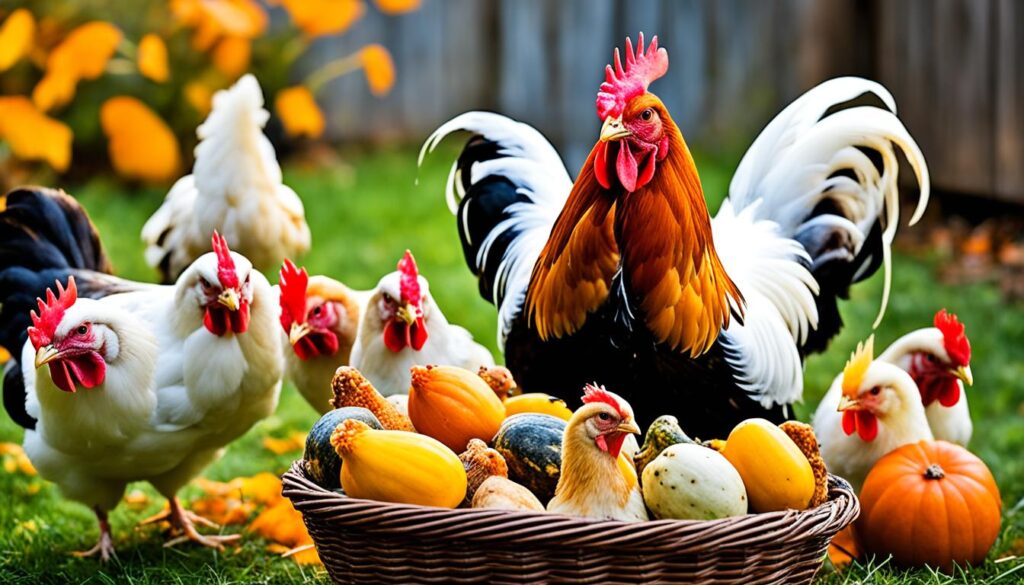
3. Provide Treats in the Morning
Offer treats to chickens in the morning before they go out exploring. This ensures that they still consume their complete feed throughout the day and receive all the necessary nutrients.
“Feeding treats to chickens can be a fun and rewarding experience. Just remember to do it in moderation and choose treats that enhance their diet.” – Chicken owner
4. Be Mindful of Quantity
It’s important not to overfeed treats to chickens. While they may love the extra goodies, too many treats can disrupt their nutritional balance and lead to health issues. Stick to the 10% rule and provide treats sparingly.
5. Monitor Behavior and Health
Observe your chickens’ behavior and overall health when introducing treats. If you notice any negative changes, such as reduced appetite or digestive issues, it may be necessary to adjust or eliminate certain treats from their diet.
6. Use Treats as Training Tools
Treats can also be used as training tools for chickens. By associating treats with desired behaviors, you can reinforce positive actions and encourage cooperation.
By following these guidelines, you can ensure that your chickens receive treats in a controlled and responsible manner, keeping them happy, healthy, and well-nourished.
Best Treats for Chickens
When it comes to treating your chickens, it’s important to choose options that are natural, healthy, and wholesome. While scraps, scratch grains, and mealworms can be tempting treats, it’s essential to offer them in moderation to prevent any negative impact on their diet.
If you’re looking for a recommended option that provides a balanced nutritional boost for your feathered friends, consider Purina Farm to Flock Treats. These treats are designed to keep your chickens strong and healthy with a mix of grains, vitamins, minerals, and amino acids.
Feeding your chickens these high-quality treats not only offers them a delectable snack but also complements their complete feed. With the perfect blend of natural ingredients, Purina Farm to Flock Treats are an excellent addition to your chickens’ diet.
Nutritional Benefits of Purina Farm to Flock Treats:
| Treats | Nutritional Benefits |
|---|---|
| Scraps | Can be offered in small amounts, but may lack balanced nutrition |
| Scratch Grains | Can be given as a treat, but should not make up the majority of their diet |
| Mealworms | Provide protein, but should be given sparingly to avoid disrupting their diet |
| Purina Farm to Flock Treats | A balanced mix of grains, vitamins, minerals, and amino acids to support overall health |
With the nutritional benefits offered by Purina Farm to Flock Treats, you can provide your chickens with a safe and tasty snack that supports their well-being. Remember to always prioritize a high-quality complete feed as the main source of nutrients for your flock, with treats serving as a supplemental delight.
By choosing the best treats for your chickens, you can keep them happy, healthy, and thriving.
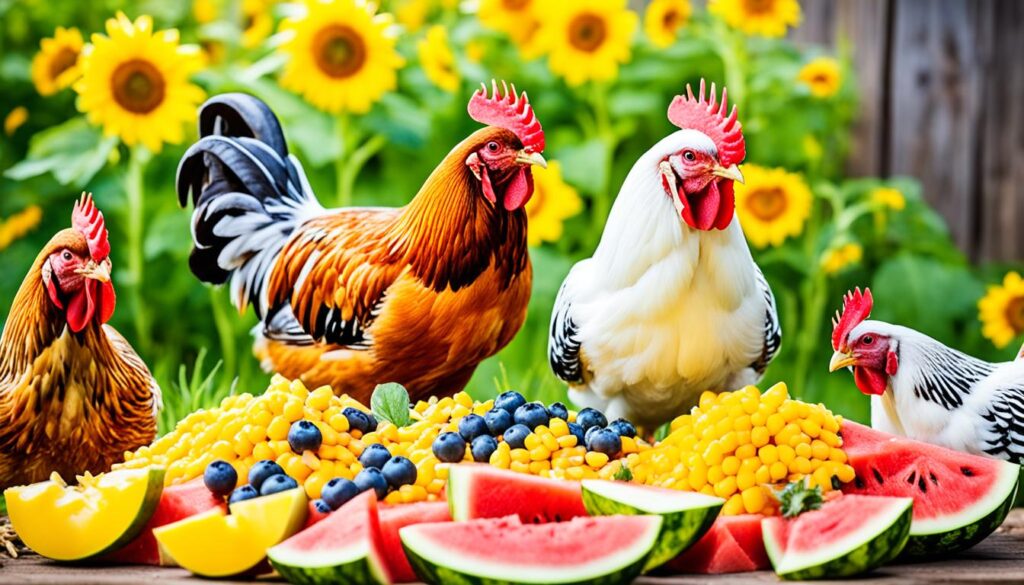
Foods to Avoid Feeding Chickens
When it comes to feeding chickens, it’s important to be aware of certain foods that should be avoided. These foods can be harmful to their health and well-being. Below are some key foods that you should refrain from feeding to your chickens:
- Bread: While bread may seem like a harmless treat, it has little nutritional value for chickens. Feeding them bread regularly can lead to nutritional deficiencies and can also cause deformities and crop blockages.
- Raw meat: Raw meat, including chicken, should be avoided in chickens’ diets. Raw meat may contain harmful bacteria such as salmonella, which can cause severe health issues in chickens.
- Raw eggs: Similarly, feeding raw eggs to chickens can pose a risk of salmonella contamination. It’s best to avoid providing them with raw eggs to prevent potential health problems.
- Avocado pits and skins: Avocado pits and skins contain a toxin called persin, which is toxic to chickens. Feeding them avocado pits and skins can have detrimental effects on their health. It’s best to remove these parts before giving avocados to your chickens.
By avoiding these foods in your chickens’ diet, you can ensure their health and well-being. It’s important to provide them with a balanced diet that consists of high-quality feeds, fresh fruits, vegetables, and appropriate treats.
| Foods | Reasons to Avoid |
|---|---|
| Bread | Little nutritional value and can cause deformities and crop blockages |
| Raw Meat | Risk of salmonella and other harmful bacteria |
| Raw Eggs | Risk of salmonella and other harmful bacteria |
| Avocado pits and skins | Contain persin, a toxin that is toxic to chickens |
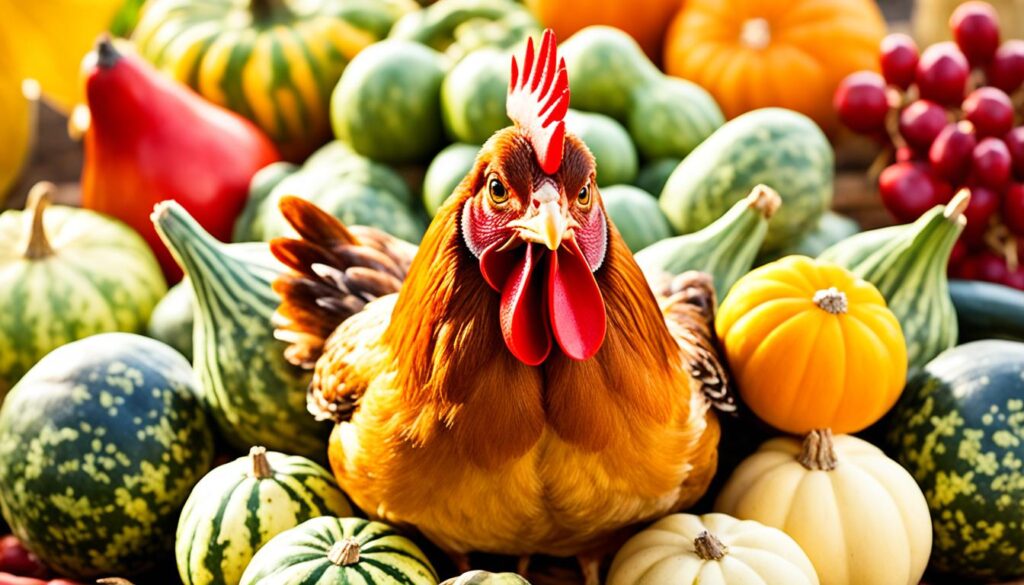
Foods That Are Toxic to Chickens and Ducks
While chickens and ducks can enjoy a wide variety of foods, it’s essential to be aware of the foods that can be toxic to them. Feeding these harmful foods to poultry can have serious consequences for their health and well-being. Here are some foods that you should avoid feeding to your chickens and ducks:
Bread:
Bread may be a common food for humans, but it is not suitable for chickens and ducks. While a small piece of bread as an occasional treat may not cause harm, feeding bread regularly or in large quantities can lead to several problems. Bread has little nutritional value for poultry and can cause digestive issues such as crop impaction. Additionally, feeding bread can contribute to nutrient imbalances in their diet, leading to deficiencies or other health issues over time.
Raw Meat:
Feeding raw meat to chickens and ducks is not recommended. Raw meat, including raw chicken or other poultry, can pose a significant risk of salmonella and other harmful bacteria. These bacteria can cause serious illnesses in birds, leading to infection, diarrhea, and even death. It is best to cook the meat thoroughly before offering it as a treat to ensure the safety of your poultry.
Raw Eggs:
While chickens and ducks may naturally consume their own eggs in certain circumstances, feeding them raw eggs can be problematic. Raw eggs can carry salmonella and other bacteria that can potentially harm the birds. It is essential to collect eggs promptly and prevent any cracked or broken eggs from being ingested by the flock.
Avocado Pits and Skins:
Avocado pits and skins contain a toxin called persin, which is toxic to both chickens and ducks. Feeding avocados or any part of the fruit to poultry can lead to serious health issues, including heart and respiratory problems, organ failure, and death. It is crucial to keep avocados away from your flock’s diet to ensure their safety and well-being.
By avoiding these toxic foods, you can protect the health of your chickens and ducks and ensure that they thrive in a safe and nurturing environment.
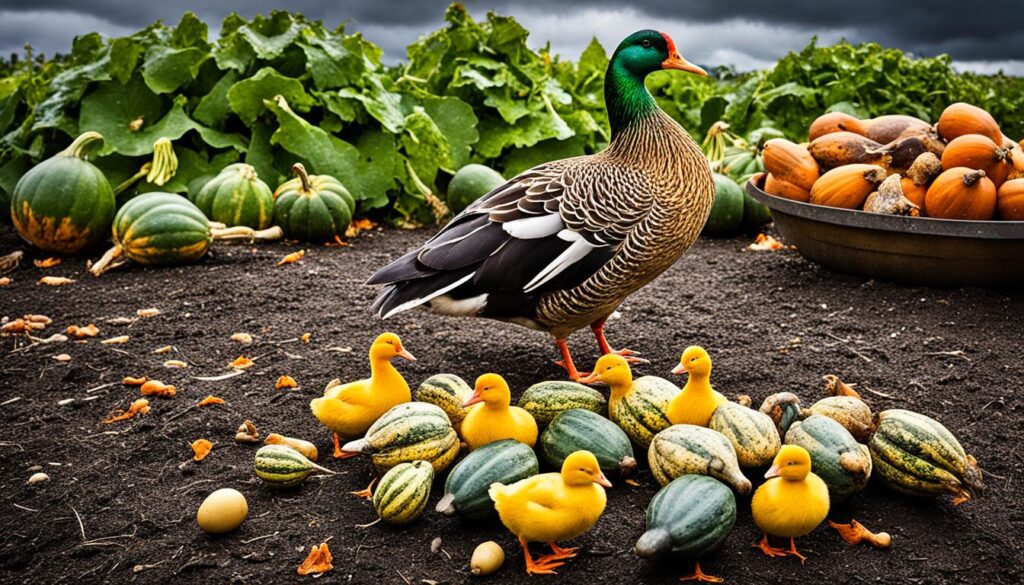
| Potentially Toxic Foods | Consequences for Chickens and Ducks |
|---|---|
| Bread | Crop impaction and nutrient imbalances |
| Raw Meat | Risk of salmonella and other harmful bacteria |
| Raw Eggs | Risk of salmonella and potential infections |
| Avocado Pits and Skins | Heart and respiratory problems, organ failure, and death |
Safe Treats and Food for Chickens and Ducks
When it comes to feeding chickens and ducks, it’s essential to provide them with safe and nutritious treats. Offering a variety of grains, fruits, vegetables, and cooked meat can not only add flavor to their diet but also ensure their overall well-being. By incorporating these safe foods into their feeding routine, you can keep your feathered friends healthy and happy!
Grains: A Staple in Their Diet
Grains make an excellent addition to the diet of chickens and ducks. They are a valuable source of energy and can be easily digested. Consider including the following types of grains in their meals:
- Rice
- Wheat
- Corn
- Oats
These grains can be given as is or mixed with their regular feed to provide a wholesome treat that they’ll enjoy.
Fruits: Nature’s Sweet Treats
Fresh fruits are not only a delightful treat for chickens and ducks but also a great source of vitamins and minerals. While fruits should be given in moderation due to their sugar content, they can still be a healthy addition to their diet. Some safe fruits for your feathered friends include:
- Watermelon
- Strawberries
- Blueberries
These juicy treats can be chopped into bite-sized pieces and offered as a refreshing snack on hot summer days.
Vegetables: Adding Variety to Their Meals
Incorporating vegetables into the diet of chickens and ducks is an excellent way to provide them with essential nutrients. You can offer the following vegetables as safe and nutritious treats:
- Lettuce
- Kale
- Broccoli
- Carrots
These vegetables can be chopped or shredded and served raw or cooked. Just make sure to avoid any seasonings or additives that may be harmful to them.
Cooked Meat: A Protein-Packed Delight
Chickens and ducks are omnivores, meaning they can also enjoy small portions of cooked meat as a special treat. Remove any bones and excess fat before offering cooked meat to your feathered friends. Cut it into small pieces to make it easier for them to eat. Remember to avoid feeding them raw meat, as it can pose health risks.
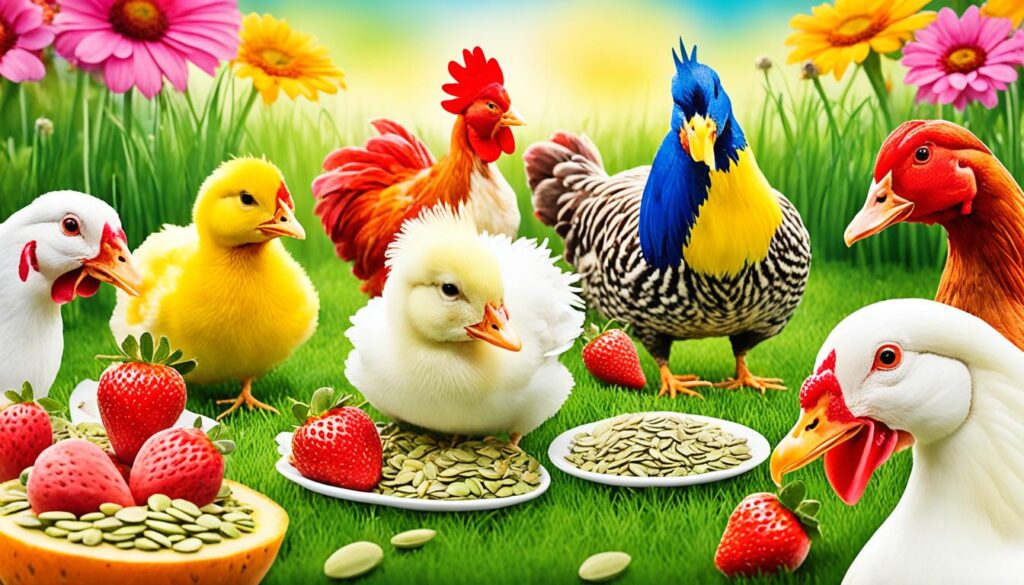
It’s important to note that treats should only constitute a small portion of their overall diet. The majority of their nutrition should come from a balanced and complete feed that provides them with all the necessary vitamins and minerals.
By offering safe treats and food options, you can ensure that your chickens and ducks enjoy a varied and nutritious diet, leading to their optimal health and happiness.
Conclusion
In conclusion, gourds such as pumpkins can be a safe and healthy snack for chickens. These versatile vegetables provide chickens with a range of nutrients as they can enjoy the flesh, seeds, and skin of gourds. However, it’s important to exercise caution and avoid feeding them moldy, decorated, or painted gourds, as these can be harmful to their health.
When it comes to treats, it’s crucial to feed them to chickens in moderation. Opt for natural and wholesome options that align with their dietary needs. Remember that a high-quality complete feed should always be the primary source of nutrients for chickens, providing the necessary balance of vitamins, minerals, and proteins.
By following these guidelines, you can ensure that your flock of chickens stays healthy, happy, and well-fed. Providing gourds and other safe snacks as treats can be a great way to diversify their diet and keep them satisfied. Remember to prioritize their overall nutrition by offering a high-quality complete feed, and supplement it with treats that add variety while maintaining their optimal health.
